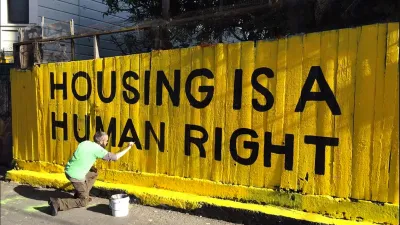Some of the world's biggest companies are investing in affordable housing, hoping to stymie the growing crisis their growth has contributed to.

Amazon's newly launched Housing Equity Fund promises to build and preserve more than 20,000 housing units near the company's three U.S. hubs with a $2 billion investment. The program includes below-market grants and loans to "public agencies, housing partners and minority-led groups," according to Cailin Crowe.
Amazon expects the workforce at these three locations to reach around 5,000 employees in the next few years and calls the housing initiative an effort to "be part of the solution" to the housing affordability crisis facing many of their employees and other residents in surrounding communities. "Tech giants like Amazon have made a number of affordable housing investments in recent years, a problem many experts have said such companies helped create," writes Crowe. Apple, Microsoft, Google, and Facebook have all made billion-dollar commitments ($2.5 billion in Apple's case) to investing in affordable housing.
Experts like Sarah Rosen Wartell, president of the Urban Institute, laud the companies' efforts to support affordable housing, noting that the move also signals to local elected leaders that "investment in affordable housing is a critical, necessary step for a region's balanced, healthy economy." King County Councilmember Jeanne Kohl-Welles expressed appreciation for the pledges, but acknowledged there's a long way to go. "This investment is a relative drop in the bucket, but Amazon’s loans and grants will provide much needed capital for expanding our supply of affordable housing now, when our communities need it the most."
FULL STORY: Amazon commits $2B to housing equity

Alabama: Trump Terminates Settlements for Black Communities Harmed By Raw Sewage
Trump deemed the landmark civil rights agreement “illegal DEI and environmental justice policy.”

Planetizen Federal Action Tracker
A weekly monitor of how Trump’s orders and actions are impacting planners and planning in America.

Why Should We Subsidize Public Transportation?
Many public transit agencies face financial stress due to rising costs, declining fare revenue, and declining subsidies. Transit advocates must provide a strong business case for increasing public transit funding.

Understanding Road Diets
An explainer from Momentum highlights the advantages of reducing vehicle lanes in favor of more bike, transit, and pedestrian infrastructure.

New California Law Regulates Warehouse Pollution
A new law tightens building and emissions regulations for large distribution warehouses to mitigate air pollution and traffic in surrounding communities.

Phoenix Announces Opening Date for Light Rail Extension
The South Central extension will connect South Phoenix to downtown and other major hubs starting on June 7.
Urban Design for Planners 1: Software Tools
This six-course series explores essential urban design concepts using open source software and equips planners with the tools they need to participate fully in the urban design process.
Planning for Universal Design
Learn the tools for implementing Universal Design in planning regulations.
Caltrans
Smith Gee Studio
Institute for Housing and Urban Development Studies (IHS)
City of Grandview
Harvard GSD Executive Education
Toledo-Lucas County Plan Commissions
Salt Lake City
NYU Wagner Graduate School of Public Service





























